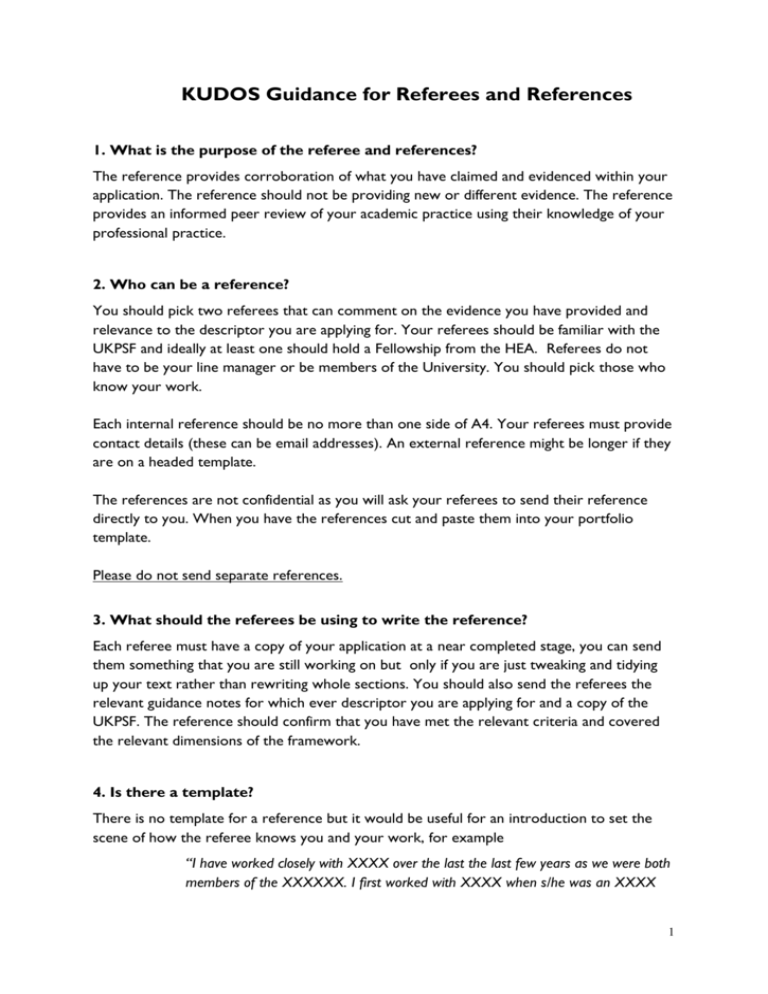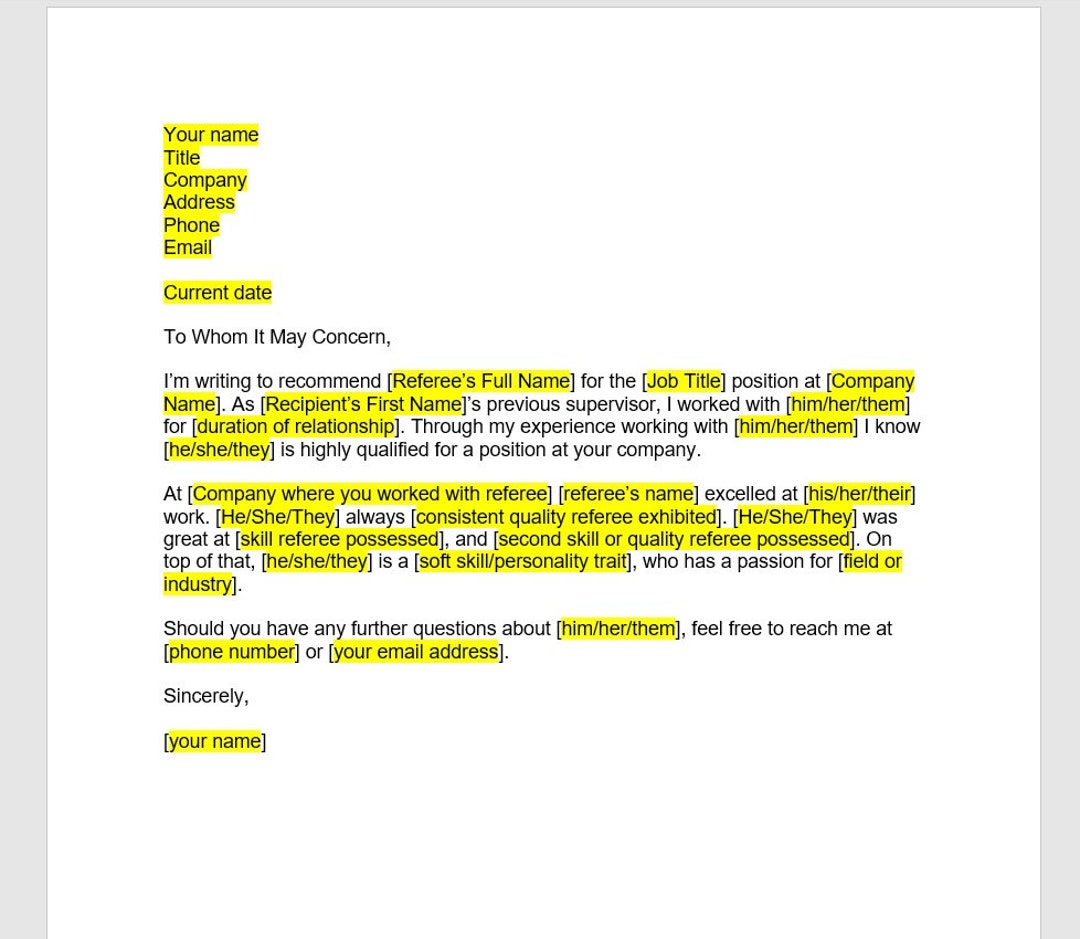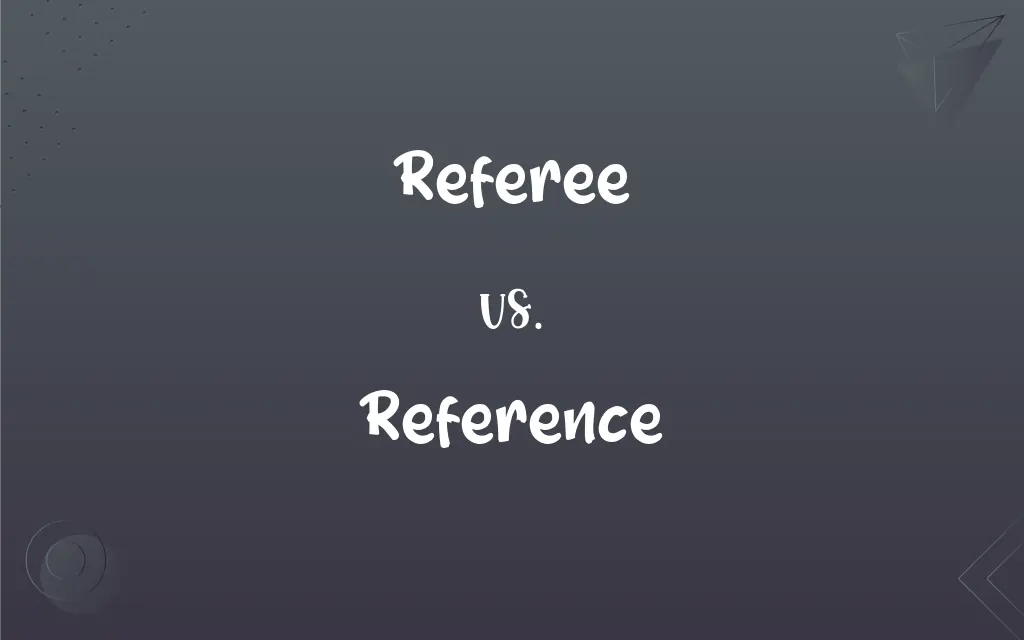The Secret Of Info About What Is A Referee Reference

Unpacking the Mystery
1. Why Are Referee References Even A Thing?
Alright, let's get down to brass tacks. You've probably seen "references" listed on job applications or heard someone say, "I need a referee." But what does it really mean? Simply put, a referee reference is a testimonial from someone who knows you professionally (or sometimes academically) and can vouch for your skills, work ethic, and overall character. Think of them as your personal cheerleaders, armed with anecdotes and examples to convince potential employers that you're the bee's knees.
Imagine you're baking a cake (stay with me!). You can say it's delicious, but wouldn't it be more convincing if five other people raved about it too? That's what a referee reference does. It provides that extra layer of credibility, moving beyond your own claims and showcasing what others think of you in a professional context. They help paint a more complete picture of who you are beyond just your resume.
But it's not just about saying nice things. A good reference goes deeper. They provide specific examples of your achievements, highlighting how you handled challenging situations, demonstrated leadership, or contributed to team success. They need to back up claims with substance, turning simple praise into compelling evidence of your capabilities.
And let's be honest, in today's competitive job market, a strong reference can be the difference between landing an interview and having your application tossed into the virtual bin. It's an invaluable tool in your job-seeking arsenal. So, choose your referees wisely!
Who Should You Ask to Be Your Referee? (And Who Should You Definitely Not Ask!)
2. Choosing Wisely
Okay, so you need a referee. But grabbing the first person you see and pleading with them isn't the smartest move. Strategically selecting your referees is crucial. Ideally, you want someone who knows you well in a professional setting — a former manager, a supervisor, a professor, or even a senior colleague. The key is to find someone who can speak knowledgeably and enthusiastically about your abilities.
Think about the specific job you're applying for. What skills and qualities are they looking for? Then, consider who in your network can best speak to those attributes. For example, if the job requires strong teamwork skills, a colleague who worked with you on a successful group project would be a fantastic choice. Conversely, a referee from a completely unrelated field might not be as effective.
Here's a pro tip: always, always ask permission before listing someone as a referee. It's common courtesy, and it also gives them a heads-up to prepare and think about what they want to say. Plus, it avoids the awkwardness of them being caught off guard by a phone call from a potential employer.
Now, who should you avoid? Well, unless specifically requested, steer clear of family members or close friends. While they undoubtedly think you're amazing, their opinions might be perceived as biased. Similarly, avoid using someone you haven't worked with in years, as their recollections might be outdated or irrelevant. And definitely don't use someone you had a bad experience with — that's just asking for trouble!

Preparing Your Referees for Success (It's a Two-Way Street!)
3. Setting Your Referees Up For Success
So, you've chosen your referees and they've graciously agreed to help. Awesome! But your work isn't quite done. To ensure they provide the best possible reference, it's essential to equip them with the necessary information. Think of it as providing them with cheat sheet for the interview.
Start by sending them a copy of your resume and the job description. This allows them to tailor their reference to the specific requirements of the role. Highlight any particular skills or experiences you want them to emphasize. The more information you give them, the better prepared they'll be to sing your praises.
It's also helpful to jog their memory with specific examples of your accomplishments. Remind them of that time you successfully led a challenging project, exceeded sales targets, or resolved a difficult customer issue. These concrete examples will make their reference much more impactful and convincing.
Finally, let them know the timeline for when they might be contacted. This will give them ample time to prepare and respond promptly. A timely reference can make a big difference in the hiring process. And remember, a little thank you goes a long way! A handwritten note or a small gift is a thoughtful way to express your appreciation for their support.

UKPSF Referee Guidance Writing Effective References
Different Types of Referee References
4. Navigating The Reference Landscape
While the term "referee reference" generally refers to professional endorsements, it's worth noting that there are different types. The most common is a professional reference, as we've already discussed. This comes from someone you've worked with and focuses on your skills and abilities in a work environment.
However, you might also encounter requests for personal references. These are typically sought for volunteer positions, board memberships, or even rental applications. A personal reference comes from someone who knows you on a more personal level — a neighbor, a community leader, or even a long-time friend. They can speak to your character, integrity, and general suitability for the role.
Academic references are another type, often required for graduate school applications or academic positions. These come from professors or academic advisors who can attest to your intellectual abilities, research skills, and overall academic performance. They'll often discuss your coursework, research projects, and any contributions you made to the academic community.
The key is to understand what type of reference is being requested and choose your referees accordingly. A professional reference won't be much help when applying for a volunteer position, and vice versa. By selecting the right type of referee, you'll maximize your chances of success.

What Is A Reference Example Unveiling The Key To Citing Sources
The Art of Following Up (Without Being Annoying!)
5. The Follow-Up Dance
You've asked for a reference, provided your referees with all the necessary information, and now... you wait. But how long should you wait? And what's the best way to follow up without appearing pushy or annoying? This is where the art of the follow-up comes in.
Generally, it's a good idea to give your referees a week or two to respond. They're likely busy people, so give them ample time to write a thoughtful and detailed reference. However, if you haven't heard back after that period, it's perfectly acceptable to send a polite follow-up email.
Keep your follow-up brief and to the point. Remind them of the job you're applying for and reiterate the importance of their reference. You could say something like, "I wanted to gently follow up on my request for a reference for the [Job Title] position at [Company Name]. The deadline for submissions is approaching, and your input would be greatly appreciated."
Avoid being demanding or accusatory. Remember, your referees are doing you a favor, so treat them with respect and understanding. If they're unable to provide a reference due to time constraints or other commitments, thank them for their consideration and move on to another potential referee.

Reference Letter Template Free Download Easy Legal Docs
FAQ
6. Quick Answers to Common Questions
Still have questions about referee references? You're not alone! Here are some frequently asked questions to help clear things up:
7. Q
A: Typically, employers ask for two or three references. However, always check the job application to see if there are specific requirements. If they only ask for one, provide one stellar reference rather than three mediocre ones.
8. Q
A: If you're a recent graduate or have limited work experience, consider using academic references from professors or instructors. You can also use references from volunteer experiences or extracurricular activities. The key is to highlight skills and qualities relevant to the job you're applying for.
9. Q
A: This is a common concern. In this case, it's perfectly acceptable to provide references from previous employers or colleagues. You can also explain to the potential employer that you're not comfortable providing references from your current employer at this stage in the process. Most employers will understand and respect your privacy.
10. Q
A: While LinkedIn recommendations can be helpful, they shouldn't be used as a direct substitute for traditional referee references. Employers typically prefer to contact referees directly to have a conversation about your skills and experience. However, you can certainly mention your LinkedIn recommendations to potential employers and encourage them to check them out.
